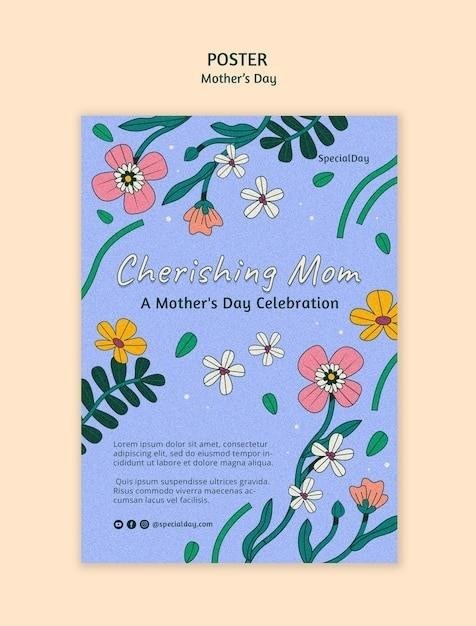In Search of Our Mothers’ Gardens⁚ A Literary Analysis
Alice Walker’s “In Search of Our Mothers’ Gardens” is a powerful essay that explores the legacy of Black women and their contributions to society. Through vivid imagery and personal anecdotes, Walker delves into the lives of her own mother and grandmother, highlighting their resilience, creativity, and hidden talents. The essay serves as a poignant reminder of the unsung heroes who have shaped our history and culture, and its enduring relevance continues to inspire generations of readers.
The Significance of Alice Walker’s “In Search of Our Mothers’ Gardens”
Alice Walker’s “In Search of Our Mothers’ Gardens” is a seminal piece of feminist and Black literary scholarship that holds profound significance for its exploration of the lives and experiences of Black women in the United States. It serves as a powerful testament to the strength, resilience, and creative spirit of Black women, often overlooked and marginalized in historical narratives. Through a deeply personal narrative, Walker challenges conventional interpretations of Black womanhood and reclaims the agency and value of these often-silenced voices. The essay’s impact extends beyond its literary merit, as it has become a cornerstone of Black feminist thought and a source of inspiration for generations of activists and scholars engaged in the fight for social justice and equality.
Exploring the Legacy of Black Women
Walker’s essay delves into the rich legacy of Black women, highlighting their contributions to both family and community despite facing systemic oppression and limited opportunities. The essay acknowledges the historical and cultural context of Black women’s lives, emphasizing the enduring spirit of survival and creativity that has defined their experience. Walker’s exploration goes beyond the traditional narratives that often focus on the struggles of Black women, highlighting their unique strengths, talents, and artistic expressions that have shaped their lives and the broader cultural landscape. By centering Black women’s voices and experiences, Walker dismantles stereotypes and reclaims their agency, offering a powerful counter-narrative to the dominant historical discourse.
The Power of the Garden as a Metaphor
The garden serves as a central metaphor in Walker’s essay, representing the hidden talents, aspirations, and creativity of Black women. It symbolizes the nurturing, life-sustaining qualities of Black women, drawing parallels between their roles as caregivers and their ability to cultivate beauty and resilience in the face of adversity. Walker uses the garden to evoke the unseen labor and artistic expression of Black women, who have often been relegated to the margins of history and denied recognition for their contributions. Through the garden, Walker elevates their experiences, illuminating their inherent artistry and their ability to create beauty and sustenance even within oppressive circumstances. The metaphor of the garden underscores the enduring legacy of Black women, highlighting their resilience, creativity, and the powerful impact they have had on shaping their communities and the world around them.
The Role of Motherhood and Grand motherhood in Walker’s Work
Motherhood and grandmotherhood are not merely familial roles in Walker’s work; they embody a profound legacy of resilience, creativity, and cultural transmission. The essay “In Search of Our Mothers’ Gardens” showcases the interconnectedness of these roles, highlighting how Black women’s experiences as mothers and grandmothers shape their identities, their artistic expressions, and their contributions to society. Walker emphasizes the unsung sacrifices and artistic talents of her own mother and grandmother, showcasing their impact on her own life and the broader Black community. Through these figures, Walker explores the complex interplay of personal and collective narratives, emphasizing the enduring power of Black women’s legacy and their vital role in shaping cultural traditions and artistic expression.
The Impact of “In Search of Our Mothers’ Gardens” on Feminist Literature
“In Search of Our Mothers’ Gardens” significantly impacted feminist literature by challenging traditional notions of feminism and expanding the discourse to encompass the experiences of Black women. Walker’s essay, rooted in the concept of womanism, brought to light the unique challenges and triumphs faced by Black women in a society marked by both sexism and racism. The essay’s focus on the intersectionality of race and gender, combined with its exploration of the cultural and artistic contributions of Black women, paved the way for a more inclusive and nuanced understanding of feminism. It inspired a generation of writers and scholars to examine the complexities of Black women’s lives and to celebrate their resilience, creativity, and contributions to society.
The Importance of Recognizing the Contributions of Black Women
Alice Walker’s “In Search of Our Mothers’ Gardens” is a powerful call to recognize the contributions of Black women, often overlooked or marginalized in historical narratives. Walker emphasizes the significance of acknowledging the hidden talents, resilience, and creativity of Black women, particularly those who lived through challenging times. She highlights how their contributions, often expressed through domesticity, artistry, and community building, have shaped society and culture. By celebrating these contributions, Walker seeks to rewrite the narrative, ensuring that Black women are no longer relegated to the margins of history. Her essay is a poignant reminder that their voices and stories deserve to be heard and celebrated.
The Enduring Relevance of Walker’s Essay
Alice Walker’s “In Search of Our Mothers’ Gardens” remains relevant today for its powerful exploration of Black women’s experiences and its call for recognition of their contributions. The essay’s themes of resilience, creativity, and the importance of honoring hidden histories resonate deeply with contemporary readers. Its examination of the impact of systemic oppression on Black women’s lives continues to be a vital conversation, particularly in the face of ongoing social and political struggles. Walker’s work serves as a reminder of the need to acknowledge and celebrate the achievements of marginalized communities and to ensure that their stories are heard and valued. The essay’s enduring power lies in its ability to inspire and empower generations of readers to challenge injustice and strive for a more equitable future.

The Legacy of “In Search of Our Mothers’ Gardens”
Alice Walker’s essay has left an indelible mark on literary and feminist discourse, inspiring countless writers, artists, and activists.
The Essay’s Influence on Contemporary Literature
Alice Walker’s “In Search of Our Mothers’ Gardens” has profoundly influenced contemporary literature, inspiring countless writers to explore themes of identity, heritage, and the legacy of Black women. Its impact can be seen in the works of authors like Toni Morrison, Maya Angelou, and bell hooks, who have all drawn upon Walker’s insights to delve into the complexities of Black womanhood. The essay’s exploration of the creative spirit that flourishes even in the face of adversity has resonated with writers across genres, encouraging them to embrace their own voices and stories. The essay’s use of personal narrative and its focus on the hidden histories of Black women have also paved the way for a more inclusive and multifaceted approach to literary storytelling. Walker’s work has challenged traditional narratives and opened up new possibilities for exploring the human experience.
The Essay’s Impact on the Black Feminist Movement
“In Search of Our Mothers’ Gardens” has been a cornerstone of the Black feminist movement, serving as a catalyst for dialogue and action. Walker’s personal narrative resonated with Black women who felt unheard and unseen within mainstream feminist movements. The essay’s focus on the unique experiences and challenges faced by Black women, particularly in the context of racism and sexism, gave voice to a marginalized perspective. By highlighting the contributions and resilience of Black women, Walker challenged the prevailing narratives that often overlooked their contributions and struggles. The essay’s call for recognition and empowerment has inspired generations of Black feminists to advocate for social justice and equality.
The Enduring Relevance of Walker’s Message
The message of “In Search of Our Mothers’ Gardens” remains deeply relevant in today’s world. Walker’s call to recognize and celebrate the hidden talents and contributions of Black women continues to be a crucial reminder of the importance of acknowledging marginalized voices. The essay’s exploration of the intersection of race, gender, and class resonates with contemporary conversations about social justice and equality. Moreover, Walker’s emphasis on the power of storytelling as a tool for empowerment and healing continues to inspire individuals and communities to share their own narratives and reclaim their history. “In Search of Our Mothers’ Gardens” serves as a timeless testament to the strength, resilience, and creativity of Black women, reminding us of the enduring legacy they have left behind.







